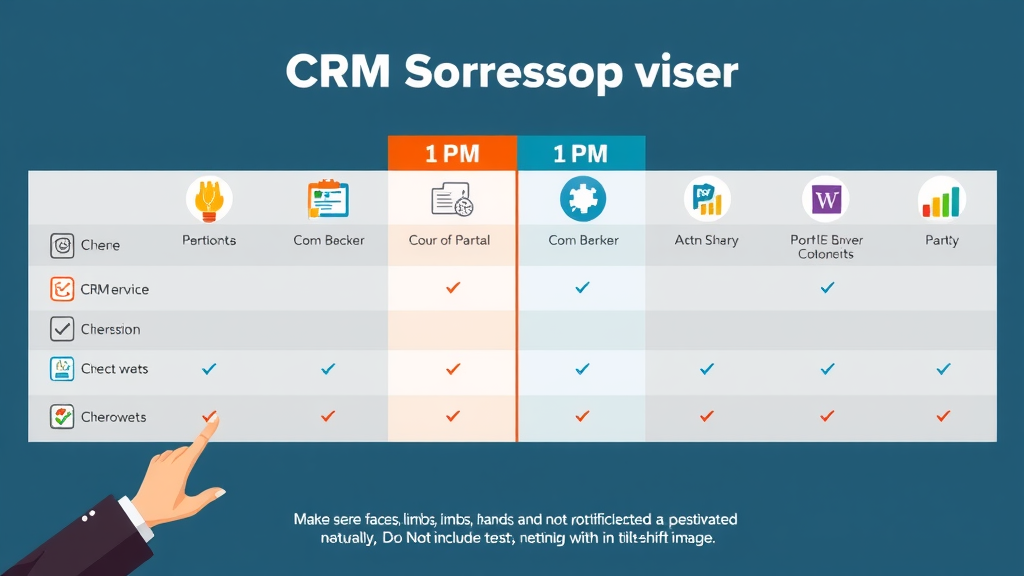
Did you know: Nearly 60% of small businesses still operate without a proper CRM system, missing out on up to 29% more sales ? Choosing the right crm software for small businesses isn’t just about tracking leads—it’s the secret weapon that empowers your team, nurtures customer relationships, and drives sustainable growth. If you want maximum sales and loyal customers, don’t make a move until you check this numerical, expert-curated guide.
How CRM Software for Small Businesses Is Revolutionizing Success: Surprising Facts You Need to Know
- Did you know that small businesses using CRM software experience up to a 29% increase in sales ?
- Over 60% of small businesses still operate without a dedicated CRM tool, risking lost leads and revenue.
- Free CRM options have exploded in popularity , making advanced features accessible even for startups.
Embracing CRM software for small businesses is no longer just a luxury—it's a competitive necessity. Not only do CRM systems boost sales, but they also streamline workflow, enhance customer satisfaction, and provide business intelligence to help you grow faster. Many entrepreneurs are surprised at how quickly implementing a business CRM delivers tangible ROI, whether by automating repetitive tasks or giving the sales team a 360-degree customer view.
Free CRM offerings, led by tools like Zoho CRM and HubSpot CRM , have widened access to powerful contact management , workflow automation, and analytics. Even if you’re a solopreneur or a startup with a lean team, you can now access features that were once only reserved for enterprise-level organizations. The takeaway? Avoid falling behind—unlock opportunity with the right CRM features tailored to your needs!
What You’ll Gain From This Comparison of CRM Software for Small Businesses
- Discover the must-have CRM features tailored for small businesses.
- Learn how to compare CRM pricing, including hidden costs.
- Uncover free CRM solutions that don’t sacrifice on power.
- See real-world use cases from small businesses like yours.
This guide dissects everything you need to know to make a confident decision about crm software for small businesses . From essential features to the best free CRM tools, we cover proven ways to cut costs, spot hidden fees, and select solutions that deliver measurable business improvements. Dive in for comparisons and actionable steps—no sales fluff, just the facts and tools to help you close more deals.
We also tackle key questions about CRM costs, integrations, customer data security, and support. If you’re overwhelmed by CRMs with long feature lists, this breakdown will help prioritize exactly what will move your business forward, whether you’re just starting out or looking to upgrade your current business crm .
Top 15 Essential Features in CRM Software for Small Businesses

- Contact Management Tools for Powerful Organization
- Customer Data Insights to Boost Engagement
- Automated Email Marketing for Lead Nurturing
- Intuitive Sales Pipeline and Sales Team Collaboration
- Mobile CRM for Small Business On-the-Go Access
- Integration with Social Media Channels
- Workflow Automation Saves Time for Small Businesses
- Easy Task and Calendar Management
- Customizable Dashboards & Reporting Tools
- Free CRM Options and Affordable Paid Upgrades
- Advanced Security for Sensitive Customer Relationship Data
- Seamless Ad Management for Omnichannel Campaigns
- Responsive Customer Service and Support
- Scalable CRM System to Grow With Your Business
- Cohesive All-in-One Platform with CRM Software Suite
When shopping for crm software for small businesses , this checklist is mission-critical. Advanced contact management and email marketing functions form the foundation, but the real difference comes from features like workflow automation, sales pipeline visualization , and actionable reporting.
Look for a crm system that streamlines social media and ad management, offers integrations with core business tools (like Google Workspace or accounting systems), and includes responsive customer service—because delays in help can cost your business time and money. Finally, opt for platforms that are mobile-ready and scalable, helping your CRM for small business evolve as you do.
"The right CRM software for small businesses doesn’t just store contacts—it unlocks opportunities and accelerates your growth."
Best CRM Software for Small Businesses in 2024: Side-by-Side Comparison

| CRM Name | Best For | Key Features | Free Plan | Starting Price |
|---|---|---|---|---|
| Zoho CRM | Customizability | Management Tools, Workflow Automation | Yes | $14/user/mo |
| HubSpot CRM | Ease of Use | Contact Management, Email Marketing | Yes | Free |
| Salesforce Essentials | Sales Team Collaboration | Sales Process, Custom Dashboards | No | $25/user/mo |
| Freshsales | Lead Management | CRM Features, Workflow Automation | Yes | $15/user/mo |
| Insightly | Project Management | Contact Management, Ad Management | No | $29/user/mo |
This direct comparison spotlights why Zoho CRM and HubSpot CRM continue to dominate the small business crm and free crm market segments. Each platform brings a unique blend of CRM features: Zoho CRM is prized for customizability and robust management tools, while HubSpot CRM’s user-friendly interface makes onboarding simple for even the least tech-savvy teams. Don’t overlook newer contenders—Freshsales offers a compelling free trial and AI-supported automation, a boon for fast-paced sales teams.
Keep in mind that while free crm plans are valuable for early-stage businesses, paid upgrades unlock advanced CRM offers such as deep analytics, marketing automation, and premium support. Weigh the pros and cons using this table to ensure your next CRM for small business aligns perfectly with both current and future growth goals.
How to Choose the Right CRM Software for Small Businesses: Step-by-Step Guide
- Define Your Small Business Needs and Sales Process
- List Required CRM Features and Management Tools
- Compare Free CRM and Paid CRM Software Options
- Evaluate User Experience and Simplicity
- Check Integration With Existing Business Tools
- Harness Customer Service & Support Quality

Choosing the ideal crm for small business starts with mapping out your sales process and understanding what’s slowing you down. List out the CRM features and management tools that match these bottlenecks—automation, contact management, email marketing, or pipeline visualization. Next, stack free CRM options and paid software side by side. Does the crm system offer intuitive setup and simple onboarding? Is there a free trial ?
Integration is critical—ensure your chosen platform connects seamlessly to your email, calendar, accounting, and social media tools. Finally, test the vendor’s customer service with real questions before you invest; a responsive support team is especially vital for small businesses with limited in-house IT. Don’t be afraid to start with a free crm and scale up as your team grows!
Top 7 Free CRM Software for Small Businesses and Startups
- Zoho CRM—Robust Free CRM for Small Business
- HubSpot CRM—Most Popular Free CRM Software
- Bitrix24—AI Tools for Small Businesses
- Freshsales—Free CRM for Email Marketing and Automation
- Agile CRM—Social Media and Ad Management
- Really Simple Systems—Easy CRM System for Small Business
- Apptivo—All-in-One Free CRM Features
Never assume you have to break the bank to access top-tier CRM software. Platforms like Zoho CRM and HubSpot CRM deliver deep contact management and user-friendly dashboards without cost—perfect for small business or startups on a tight budget. These free CRM tools come loaded with essential sales pipeline, email marketing automation, and even workflow features.
Some, like Bitrix24 and Agile CRM, integrate CRM, social media, and ad management, making it easier to track leads from multiple channels. Before committing to a paid crm system, leverage these free trial options. You might discover everything you need is already available within these popular business crm suites.
"A well-chosen CRM for small businesses isn’t an expense—it’s an engine for sustainable growth and relationship building."
Hidden Costs and Pitfalls: What to Watch Out for in CRM Software for Small Businesses
- Upsell Pricing for Advanced CRM Features
- Data Migration Fees When Switching CRM Systems
- Integrations with Paid Management Tools
- Limitations in Free CRM and Upgrades Required
- Hidden Storage Costs for Customer Data

While many CRMs advertise free trials, business owners often discover hidden expenses once they start using the platform long-term. Watch for aggressive upsell pricing on crucial functions like workflow automation, in-depth reports, or email marketing. CRM systems sometimes charge extra for integrations with business-critical management tools or for storing extra customer data.
If you plan to switch CRMs or migrate your customer data , factor in potential transition fees and technical headaches. Always ask vendors about cost structures, potential upgrade triggers, and whether their “free crm” offers are genuinely comprehensive or simply a teaser for paid upgrades. The best way to avoid unwelcome surprises is thorough due diligence!
Explore firsthand how a diverse range of small businesses—retail, agencies, service providers—have transformed results by implementing CRM software for small businesses, improving customer relationships, and increasing sales pipeline efficiency.
8 Signs Your CRM Software for Small Businesses Needs an Upgrade
- Your CRM Software Lacks Modern Integration Features
- User Adoption is Low Across Your Sales Team
- Limited Automation for Contact and Email Marketing
- Inflexible Reporting and Customer Data Insights
- Slow or Non-Responsive Customer Service Support
- No Mobile CRM App for On-the-Go Access
- Ad Management, Social Media Tools Fall Short
- Lack of Free Plan or Inflexible Pricing
If your current business CRM doesn’t support integrations or lacks a mobile app, your sales team will struggle to stay efficient. Low adoption rates signal that the user interface or workflows are simply too complex for your staff to use effectively.
Missing features—such as workflow automation, email marketing, flexible reporting, or seamless ad and social media management—mean you’re missing growth opportunities. Non-responsive customer support or rigid pricing policies are also red flags. Consider these signs a strong indicator it’s time to upgrade your CRM software for small businesses .
See a guided, step-by-step tutorial—from account creation to contact import, user setup, and pipeline customization—with tips for both free crm platforms and more advanced business crm systems.
Get visual walkthroughs of the top free CRM platforms in action, including their dashboards, mobile app interfaces, contact management flows, and email marketing features.
How CRM Software for Small Businesses Improves Customer Service and Relationships

- Centralizes all customer data and interactions in one CRM system.
- Automates responses and follow-ups to create a seamless customer experience.
- Empowers the sales team with instant access to customer insights.
- Drives personalized marketing via integrated email and social media tools.
- Boosts loyalty and retention by helping small businesses anticipate customer needs.
A modern crm software suite makes every stage of the customer relationship smoother and more personal—even for micro-enterprises. By automating customer communication, centralizing data, and delivering real-time insights, your teams can delight clients and resolve issues before they escalate.
Integrated CRM systems elevate marketing impact by personalizing outreach on the channels your audience actually uses—email, SMS, and social media. Happy customers stick around; using the right crm system is your first step to building advocacy and long-term revenue.
People Also Ask About CRM Software for Small Businesses

What is the best CRM software for a small business?
HubSpot CRM , Zoho CRM , and Salesforce Essentials are widely recognized as leading CRM solutions for small businesses due to their powerful features, flexible pricing, and strong scalability. Your best choice depends on your unique needs, number of users, and growth ambitions.
How much does CRM cost for a small business?
CRM software for small businesses ranges from robust free crm options (like HubSpot CRM, Zoho CRM) to paid packages that start around $10–$30 per user per month. Pricing depends on the number of users, level of support, integrations, and advanced CRM features. Always review which capabilities are included in each tier.
What is the simplest CRM to use?
Most small businesses find HubSpot CRM , Really Simple Systems , and Freshsales especially intuitive, with clean user interfaces, easy onboarding flows, and supportive customer service teams. Choose a platform that matches your staff’s comfort level with new technology.
Which CRM is free for small business?
The top free CRM platforms for small businesses are HubSpot CRM , Zoho CRM , and Freshsales . All offer core contact management, email marketing, and workflow tools at no cost, though you should monitor your usage to avoid forced upgrade scenarios as your business grows.
Frequently Asked Questions About CRM Software for Small Businesses
- Can CRM software be customized for my small business industry? Yes! Most modern CRM systems allow for sector-specific fields, pipeline stages, and workflow automations designed for your unique use cases.
- What integrations should I prioritize for a business CRM? Focus on seamless connections to your accounting, calendar, email, marketing automation, and social media management tools.
- How secure is customer data within these CRM systems? Top providers use encryption, routine backups, and strict access controls to keep sensitive customer relationship data safe.
- Does a CRM system help with GDPR or compliance? Leading CRMs provide privacy controls and audit trails to streamline compliance with regional privacy laws.
- Are there mobile CRM apps for remote work capabilities? Yes—most leading platforms offer robust mobile apps ensuring sales teams can update and access information on the go.
Expert Tips: Maximizing ROI With CRM Software for Small Businesses

- Choose CRM features that align with your growth stage.
- Train your sales team for optimal CRM adoption and usage.
- Automate basic processes to save time and reduce errors.
- Regularly review performance analytics and adapt.
- Test free CRM platforms and pilot before rolling out company-wide.
Unlocking the full power of your crm for small business means more than just installing software. Investing time in onboarding, automation, and ongoing coaching for your team will guarantee your new business crm becomes a sales and customer service engine, not just a contact database.
Use the free trial periods and analytics dashboards not only to migrate data, but to monitor adoption rates, workflow efficiency, and customer engagement metrics. The right crm software investments pay off in sustained sales team performance, tighter customer loyalty, and easier management as you scale.
"When small business leaders prioritize CRM software, they empower every team member to deliver value at every step of the customer journey."
Checklist: 12 Steps to Successful CRM Implementation for Small Businesses

- Audit current sales process and customer journey.
- Involve stakeholders before choosing a CRM software for small businesses .
- Identify data migration requirements.
- Set up user access and permissions.
- Customize fields and workflow automations.
- Integrate email marketing and contact management.
- Train staff in all CRM features.
- Apply KPIs for business CRM usage.
- Monitor customer service responsiveness.
- Solicit team feedback for continuous improvements.
- Update and adapt the CRM system as your small business grows.
- Stay current with software updates and feature releases.
Following this roadmap will help you sidestep hidden project pitfalls, maximize adoption rates among your sales team, and lay the foundation for a scalable, high-leverage customer relationship management solution.
Run this checklist with every CRM transition—whether you’re installing your first free CRM platform or migrating to a powerful all-in-one business crm suite for an established sales team. The most successful small business CRM launches begin with planning and end with ongoing optimization.
Key Points: CRM Software for Small Businesses at a Glance
- CRM software is no longer a nice-to-have for small businesses—it’s mission-critical.
- Many business CRMs now offer free plans perfect for startups.
- CRM for small business tools help manage sales, marketing, and customer data with ease.
- Upgrade as your sales team and operation scale.
- Look for management tool integrations and strong support.
Take the Next Step With CRM Software for Small Businesses
- Ready to grow your business and connect with more customers?
- Book your free marketing strategy with our team today.
- Call: 314-560-4642 or visit: https://marketingconnectionsllc.com/get-in-touch
Action: Audit your needs, review our lists, compare options, and reach out for expert guidance before making your next CRM software decision.
When selecting CRM software for small businesses, it’s crucial to choose a solution that aligns with your specific needs and growth objectives. To assist you in this process, here are two authoritative resources that provide comprehensive insights:
-
“Best CRM for small business of 2025” : This article offers an in-depth analysis of top CRM options tailored for small businesses, highlighting key features, pricing, and user experiences to help you make an informed decision. ( techradar.com )
-
“Best CRM Software for Small Businesses” : This resource provides a detailed comparison of various CRM platforms, focusing on their suitability for small business operations, including pros and cons, to guide your selection process. ( nerdwallet.com )
By exploring these resources, you can gain valuable insights into the CRM solutions that best fit your business requirements, ensuring you choose a platform that enhances customer relationships and drives growth.
 Add Row
Add Row  Add
Add 






Write A Comment